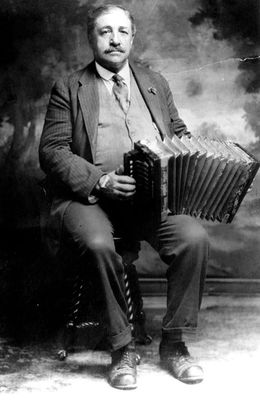Annotation:Rags (The): Difference between revisions
No edit summary |
No edit summary |
||
| Line 3: | Line 3: | ||
|f_tune_annotation_title= https://tunearch.org/wiki/Annotation:Rags_(The) > | |f_tune_annotation_title= https://tunearch.org/wiki/Annotation:Rags_(The) > | ||
|f_annotation=[[File:montmarquette.jpg|260px|thumb|right|Alfred Montmarquette]]'''RAGS, THE''' (Les Guenilles). AKA – "[[Guenille (La)]]," "[[Guénille (La)]]," "[[Reel de la guénille]]." French-Canadian, Reel and Air. D Major. Standard tuning (fiddle). AABBCCCC (Phillips): AA'BB'CC' (Reiner & Anick). A common French-Canadian reel, according to David Green in the liner notes to “Louis Beaudoin” (Philo Records, 1973). The title refers to a piece of cloth, not 'ragtime' rhythm. The tune was popularized through the performances of accordion player [[wikipedia:Alfred Montmarquette]] (1871–1944) and singer Mary Travers (La Bolduc), who set words to it. It was also recorded by fiddlers [[wikipedia:Joseph_Allard_(fiddle)]] and Isidore Soucy [https://www.thecanadianencyclopedia.ca/en/article/isidore-soucy-emc] and by numerous accordion players. Paul Fackler points out that Leo Beaudoin played a 3-part version of the tune, with a third part that is not included in Montparquette's or Soucy's version. | |f_annotation=[[File:montmarquette.jpg|260px|thumb|right|Alfred Montmarquette]]'''RAGS, THE''' (Les Guenilles). AKA – "[[Guenille (La)]]," "[[Guénille (La)]]," "[[Reel de la guénille]]." French-Canadian, Reel and Air. D Major. Standard tuning (fiddle). AABBCCCC (Phillips): AA'BB'CC' (Reiner & Anick). A common French-Canadian reel, according to David Green in the liner notes to “Louis Beaudoin” (Philo Records, 1973). The title refers to a piece of cloth, not 'ragtime' rhythm. The tune was popularized through the performances of accordion player [[wikipedia:Alfred Montmarquette]] (1871–1944) and singer Mary Travers (La Bolduc), who set words to it. It was also recorded by fiddlers [[wikipedia:Joseph_Allard_(fiddle)]] and Isidore Soucy [https://www.thecanadianencyclopedia.ca/en/article/isidore-soucy-emc] and by numerous accordion players. Paul Fackler points out that Leo Beaudoin played a 3-part version of the tune, with a third part that is not included in Montparquette's or Soucy's version. | ||
|f_source_for_notated_version=Dennis Mathieu via Louis Beaudoin (1921–1980, Burlington, Vt.) [Reiner & Anick]; Ken Kosek [Phillips]. | |f_source_for_notated_version=Dennis Mathieu via Louis Beaudoin (1921–1980, Burlington, Vt.) [Reiner & Anick]; Ken Kosek [Phillips]; Leo Beaudoin ['''Sing Out''']. | ||
|f_printed_sources=Olivier Demers ('''1000 airs du Québec et de l’Amérique francophone'''), 2020; p. 107. | |f_printed_sources=Olivier Demers ('''1000 airs du Québec et de l’Amérique francophone'''), 2020; p. 107. | ||
Hart & Sandall ('''Dance ce soir!'''), 2001; No. 14, p. 47. | Hart & Sandall ('''Dance ce soir!'''), 2001; No. 14, p. 47. | ||
Latest revision as of 04:14, 15 May 2023
X:1 T:Guenilles, Les T:Rags, The M:C| L:1/8 R:Reel N:M. Beaudoin played each part three times. D:Philo Records - "Louis Beaudoin" (1973) D:https://www.youtube.com/watch?v=HRhhNNiblxs Z:Andrew Kuntz K:D Acdd fdfd|cdef gfgB|Aceg fdfd|efec d2d2| Acdd fdfd|cdef gfg2|Aceg fdfd|1,2egec d2d2:|3egec d3|| |:a|a2ag fdfd|Acde gefg|abag fdfd|egec d3:| |:f|gage fgfg/f/|edcB Acef|gage f2 fg/f/|egec d3:|


